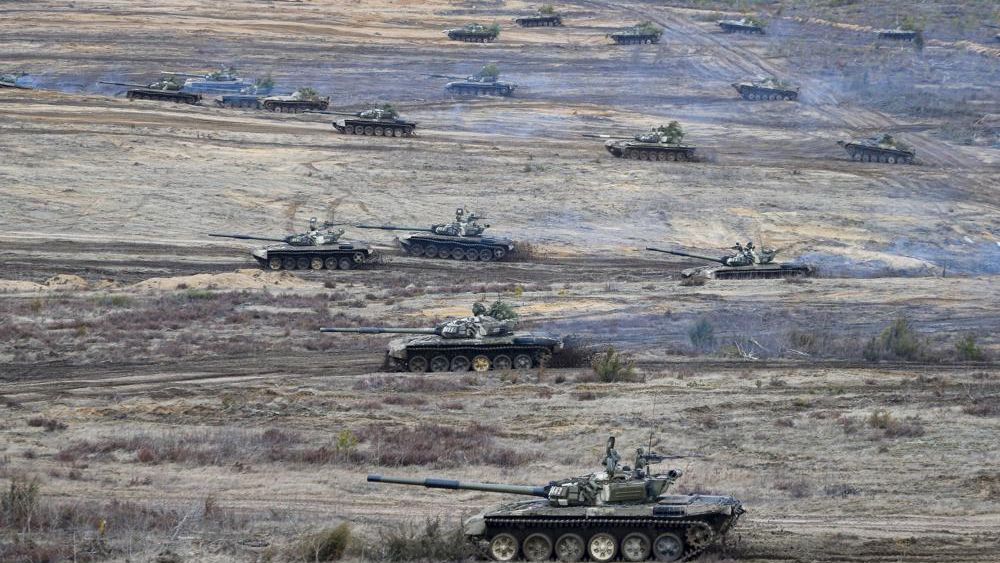Belarus' defense minister says his country’s joint exercises with Russian troops will continue because of rising tensions in Ukraine.
The exercises, which were set to end Sunday, brought a sizable contingent of Russian forces to Belarus, which borders Ukraine to the north. The presence of the Russian troops raised concern that they could be used to sweep down on the Ukrainian capital, Kyiv.
Russia and Belarus have tight cooperation under an alliance referred to as the Union State, which stops short of the countries’ actual integration.
Defense Minister Viktor Khrenin said Sunday that Belarusian President Alexander Lukashenko and Russian President Vladimir Putin decided “to continue testing the response forces of the union state.”
Khrenin cited “the increase in military activity near the external borders of the union state and the aggravation of the situation in Donbas” - the region of eastern Ukraine controlled by pro-Russia separatists.
Lukashenko joined Putin at the Kremlin on Saturday to observe Russian forces conduct nuclear drills, according to Russian officials.
Hundreds of artillery shells exploded along the contact line between Ukrainian soldiers and Russia-backed separatists, and thousands of people evacuated eastern Ukraine, further increasing fears Sunday that the volatile region could spark a Russian invasion.
Western leaders warned that Russia was poised to attack its neighbor, which is surrounded on three sides by about 150,000 Russian soldiers, warplanes and equipment. Russia held nuclear drills Saturday and conducted conventional exercises in neighboring Belarus, and has ongoing naval drills off the coast in the Black Sea.
The United States and many European countries have alleged for months that Russia is trying to create pretexts to invade. They have threatened massive, immediate sanctions if it does.
Ukrainian President Volodymyr Zelenskyy called on Russian President Vladimir Putin to choose a place where the two leaders could meet to try to resolve the crisis. Russia has denied plans to invade.
“Ukraine will continue to follow only the diplomatic path for the sake of a peaceful settlement,” Zelenskyy said Saturday at an international security conference in Munich, Germany. There was no immediate response from the Kremlin.
A top European Union official, Charles Michel, said Sunday that “the big question remains: does the Kremlin want dialogue?”
“We cannot forever offer an olive branch while Russia conducts missile tests and continues to amass troops,” Michel, the president of the European Council, said at the Munich Security Conference. He said, “One thing is certain: if there is further military aggression, we will react with massive sanctions.”
Separatist leaders in eastern Ukraine on Saturday ordered a full military mobilization and sent more civilians to Russia, which has issued about 700,000 passports to residents of the rebel-held territories. Claims that Russian citizens are being endangered might be used as justification for military action.
Officials in the separatist territories claimed Ukrainian forces launched several artillery attacks over the past day and that two civilians were killed in an unsuccessful assault on a village near the Russian border.
Vice President Kamala Harris on Sunday emphasized the significance of the moment that Europe faces.
“We’re talking about the potential for war in Europe,” Harris said at the Munich Security Conference. “It’s been over 70 years, and through those 70 years ... there has been peace and security.”
In new signs of fears that a war could start within days, Germany and Austria told their citizens to leave Ukraine. German air carrier Lufthansa canceled flights to the capital, Kyiv, and to Odesa, a Black Sea port that could be a key target in an invasion.
NATO’s liaison office in Kyiv said it was relocating staff to Brussels and to the western Ukraine city of Lviv.
President Joe Biden said late Friday that based on the latest American intelligence, he was now “convinced” that Putin has decided to invade Ukraine in coming days and assault the capital.
A U.S. military official said an estimated 40% to 50% of those ground forces have moved into attack positions closer to the border. The official, who spoke on condition of anonymity to discuss internal U.S. assessments, said the change has been underway for about a week and does not necessarily mean Putin has settled on an invasion.
Lines of communication between Moscow and the West remain open: the American and Russian defense chiefs spoke Friday. French President Emmanuel Macron spoke with Putin on Sunday. U.S. Secretary of State Antony Blinken and Russian Foreign Minister Sergey Lavrov agreed to meet next week.
Immediate worries focused on eastern Ukraine, where Ukrainian forces have been fighting the pro-Russia rebels since 2014 in a conflict that has killed some 14,000 people.
Ukraine and the separatist leaders traded accusations of escalation. Russia on Saturday said at least two shells fired from a government-held part of eastern Ukraine landed across the border, but Ukraine’s foreign minister dismissed that claim as “a fake statement.”
Top Ukrainian military officials came under a shelling attack during a tour of the front of the nearly eight-year separatist conflict in eastern Ukraine. The officials fled to a bomb shelter before hustling from the area, according to an Associated Press journalist who was on the tour.



